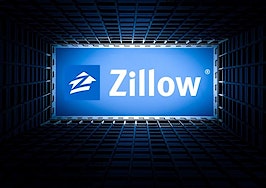Zillow dived into iBuying after seeing it, and startup Opendoor specifically, as an “existential threat,” the company’s newly reinstalled CEO said this week, and he anticipates major changes to its current practice of charging agents for a subscription to get leads.

Rich Barton, co-founder and CEO of Zillow Group
Rich Barton, who returned to the helm of Zillow last month, outlined his vision for the company in an interview this week with tech industry analyst Ben Thompson, who authors the subscription newsletter and website Stratechery.
Zillow has over the last year worked aggressively to build its own online cash offer program for homesellers, and in the interview Barton suggested those efforts came after watching rival Opendoor’s success in professionalizing the iBuyer business model.
“It was because they were going at it so hard and raising so much money from [the SoftBank] Vision Fund and what have you, they actually gave us the air cover to attack the transaction directly,” Barton said. “It became an existential threat.”
Barton also acknowledged that Zillow’s existing practice of charging real estate agents for leads wasn’t particularly disruptive, describing it as “kind of a leech on an existing business model.” Ironically, it was reading Thompson’s analysis of Opendoor and his “strategic tear-down of Zillow” that “got to my core,” Barton also said.
“Of course we needed to make a business out of it, so for a long time we figured how to make a business while we bided our time and waited for the right time to really attack the fundamental problem, and now we’re after it, so that’s great,” he continued.
The fact that Zillow has gone after Opendoor’s business thanks to Stratechery was not lost on Opendoor co-founder Keith Rabois, who quipped on Twitter Wednesday that perhaps he shouldn’t have recommended the newsletter so widely.
Seven years ago when I started recommended everyone read Stratechery, perhaps I shouldn’t have included *everyone.* https://t.co/sY5KfLCKT0
— Keith Rabois (@rabois) March 6, 2019
Barton previously served as the CEO of Zillow from its launch in 2006 to 2010, though he remained chairman of the company’s board after leaving. He also co-founded travel website Expedia in the 1990s and after leaving Zillow co-founded employer review site Glassdoor.
He replaced Spencer Rascoff as the CEO of Zillow in February. At the time, he told Bloomberg that returning to the role made sense “so that my voice is out at front during the period of extreme evangelism.”
In his interview with Stratechery this week, Barton also indicated there could be major changes coming to the way that Zillow deals with agents. Thus far, Zillow has derived profits from charging agents to appear on the site, with the idea being that would-be homebuyers will find those agents and end up working with them.
But that’s changing.
Barton told Stratechery that he wants to move away from a subscription based model and toward “a success-based compensation scheme that is around what happens when consumers actually close a transaction.” That will delay Zillow’s revenue but should whittle down the number or people the company is working with and improve the consumer experience.
“It enables us to move from a system of huge floors of people dialing for dollars for advertisers, which is what’s happening right now, to a group of people where we are actually interviewing and selecting partners we think can do the best job for our collective consumers,” Barton said. “It’s a complete mindset switch in the way we are thinking about things.”
The comment appears to reference Zillow’s Premier Broker Flex Pricing program, which debuted last year.
J.D. Ross, another cofounder at Opendoor, picked up on Barton’s comments and opined that Zillow appears to be acknowledging it will ultimately displace real estate agents.
In @zillow CEO Rich Barton’s Stratechery interview is the frank confession that they’re going to displace real estate agents because there’s nothing they can do about it anymore pic.twitter.com/DGBssXkaxt
— JD Ross (@justindross) March 6, 2019
However, after this story was published, a Zillow spokesperson noted that Ross’ comment was merely his interpretation and pointed Inman to another part of the interview where Barton discussed the importance of agents for the company’s future business. Barton described Offers as a “fast lane,” but added that most consumers will still choose a more conventional “right-hand lane.”
“So we see both of these lanes as critical because we want to serve everybody, we want to get everybody to a better place,” Barton said, referring to both Offers and the company’s agent-based business.
Though Barton appears to be committed to this new strategy, he did note that parts of it could be “painful from an investor perspective.” And that appears to have been playing out in recent months; the company’s stock is down from a year ago, when it launched the Offers program, and prices had dipped further going into February’s earnings report. As of Wednesday, the company’s share price was off about $6 from its post-earnings high.

Credit: Google
Still, Barton indicated Zillow will continue to pursue its iBuying business, explaining to Stratechery that the company hopes to make money on the fees associated with flipping houses. He also believes Zillow’s large audience and ability to synthesize different parts of the industry will ultimately make it victorious.
“The reason we win with Zillow Offers is because we have this existing business that throws off big profits and this giant audience that is effectively free to the new business development,” he said. “And the challenge is only one of strategic clarity and leadership execution, and that is why I am sitting here now.”
Update: This post was updated after publication with additional information about Barton’s comments regarding agents.












